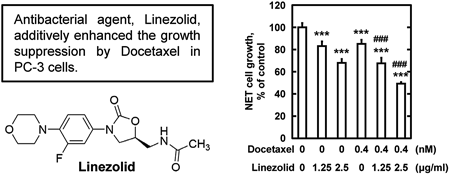- 著者
- Masahiko Imai Tomohiro Izumisawa Daisuke Saito Shinya Hasegawa Masahiro Yamasaki Noriko Takahashi
- 出版者
- The Pharmaceutical Society of Japan
- 雑誌
- Biological and Pharmaceutical Bulletin (ISSN:09186158)
- 巻号頁・発行日
- vol.46, no.5, pp.661-671, 2023-05-01 (Released:2023-05-01)
- 参考文献数
- 21
Myelosuppression, a side effect of anticancer drugs, makes people more susceptible to infectious diseases by compromising the immune system. When a cancer patient develops a contagious disease, treatment with an anticancer drug is suspended or postponed to treat the infectious disease. If there was a drug that suppresses the growth of cancer cells among antibacterial agents, it would be possible to treat both infectious diseases and cancer. Therefore, this study investigated the effect of antibacterial agents on cancer cell development. Vancomycin (VAN) had little effect on cell proliferation against the breast cancer cell, MCF-7, prostate cancer cell, PC-3, and gallbladder cancer cell, NOZ C-1. Alternatively, Teicoplanin (TEIC) and Daptomycin (DAP) promoted the growth of some cancer cells. In contrast, Linezolid (LZD) suppressed the proliferation of MCF-7, PC-3, and NOZ C-1 cells. Therefore, we found a drug that affects the growth of cancer cells among antibacterial agents. Next, when we examined the effects of the combined use of existing anticancer and antibacterial agents, we found VAN did not affect the growth suppression by anticancer agents. However, TEIC and DAP attenuated the growth suppression of anticancer agents. In contrast, LZD additively enhanced the growth suppression by Docetaxel in PC-3 cells. Furthermore, we showed that LZD inhibits cancer cell growth by mechanisms that involve phosphatidylinositol 3-kinase (PI3K)/protein kinase B (Akt) pathway suppression. Therefore, LZD might simultaneously treat cancer and infectious diseases.
- 著者
- Masahiko Imai Hiromasa Yokoe Masayoshi Tsubuki Noriko Takahashi
- 出版者
- The Pharmaceutical Society of Japan
- 雑誌
- Biological and Pharmaceutical Bulletin (ISSN:09186158)
- 巻号頁・発行日
- pp.b18-01002, (Released:2019-04-12)
- 参考文献数
- 14
- 被引用文献数
- 16
Cancer is the leading cause of death and there is a particularly pressing need to develop effective treatments for breast and prostate cancer. In the current study, we show the inhibitory effects of cinnamic acid derivatives, including caffeic acid phenethyl ester (CAPE, 1), on the growth of breast and prostate cancer cells. Among the compounds examined, 3,4,5-trihydroxycinnamic acid decyl ester (6) showed the most potent inhibition of cancer cell growth by the induction of apoptosis. Compound 6 could be a new anti-cancer agent for use against breast and prostate cancer.
